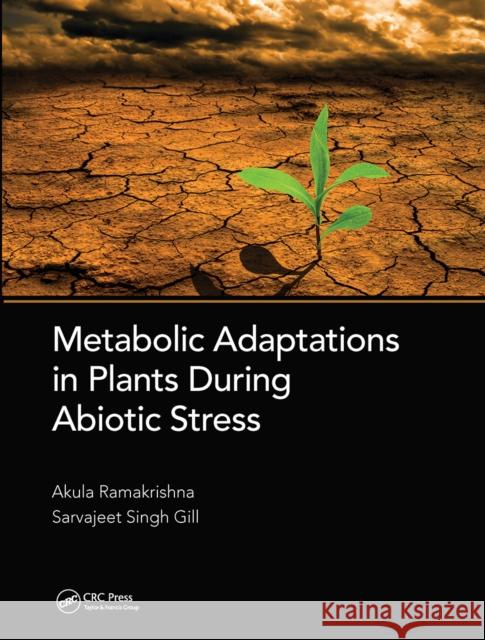Metabolic Adaptations in Plants During Abiotic Stress » książka



Metabolic Adaptations in Plants During Abiotic Stress
ISBN-13: 9781032094298 / Angielski / Miękka / 2021 / 442 str.
Metabolic Adaptations in Plants During Abiotic Stress
ISBN-13: 9781032094298 / Angielski / Miękka / 2021 / 442 str.
(netto: 223,85 VAT: 5%)
Najniższa cena z 30 dni: 226,63
ok. 22 dni roboczych.
Darmowa dostawa!
Metabolic Adaptations in Plants during Abiotic Stress covers a topic of immediate interest as the global challenge of climate change is addressed. Understanding the mechanisms of plant adaptation to environmental stresses provides the necessary tools to protect them, and hence protect ourselves.
ContentsForeword..................................................................................................................................................................................................xiAcknowledgments................................................................................................................................................................................. xiiiEditors.....................................................................................................................................................................................................xvContributors......................................................................................................................................................................................... xviiSection I Abiotic Stress Management and Its Impact on Plants1. Effects of Different Abiotic Stresses on Primary Metabolism...................................................................................................3Belen Colavolpe, Fabiana Espasandin, Juan Manuel Vilas, Santiago Maiale, Pedro Sansberro, and Oscar A. Ruiz2. Metabolic Adaptation and Allocation of Metabolites to Phloem Transport and Regulation Under Stress........................21Kathryn Dumschott, Andrew Merchant, and Millicent Smith3. Mechanism of Salt Stress Tolerance and Pathways in Crop Plants.........................................................................................27Manu Kumar and Mahipal Singh Kesawat4. Recent Advances on the Modulatory Role of ATPases toward Salt Tolerance in Plants.......................................................45Soumya Mukherjee5. Physiological and Phenological Responses of Crop Plants under Heat Stress.......................................................................55Allah Ditta6. Biochemical and Molecular Mechanisms of High-Temperature Stress in Crop Plants........................................................65Gurpreet Kaur, Bavita Asthir, and N.S. Bains7. Profiles of Antioxidant Isoenzymes and Physiological Behavior of Tomato Exposed to NaCl Stress and Treatedwith Salicylic Acid.........................................................................................................................................................................73Salma Wasti, Nizar Dhaoui, Ibtissem Medyouni, Hajer Mimouni, Hela Ben Ahmed, and Abdellah Chalh8. Toxicity of Heavy Metal and Its Mitigation Strategies through Application of Nutrients, Hormones,and Metabolites.............................................................................................................................................................................81Rachana Singh, Parul Parihar, Anita Singh, and Sheo Mohan Prasad9. Regulation of Pesticide Stress on Metabolic Activities of Plant...............................................................................................99Santwana Tiwari, Anita Singh, and Sheo Mohan Prasad10. Oxidative Stress and Its Management in Plants During Abiotic Stress................................................................................111P. Faseela, A.K. Sinisha, T.T. Dhanya Thomas, and Jos T. Puthur11. Plant Genome Response Related to Phenylpropanoid Induction under Abiotic Stresses...................................................127Ariel D. Arencibia12. Metabolic Control of Seed Dormancy and Germination: New Approaches Based in Seed ShapeQuantification in Desert Plants.................................................................................................................................................137Emilio Cervantes, José Javier Martín Gómez, and Ezzeddine Saadaoui13. Plant Ionomics: An Important Component of Functional Biology........................................................................................147Anita Mann, Sangeeta Singh, Gurpreet, Ashwani Kumar, Pooja Sujit Kumar, and Bhumesh KumarSection II Role of Major Plant Metabolites During Abiotic Stress Management14. Role of Glutamate-Derived Amino Acids under Stress Conditions: The Case of Glutamine and Proline........................157Marco Biancucci, Roberto Mattioli, Adra Mouellef, Nadia Ykhlef, and Maurizio Trovato15. Role of Glycinebetaine and Trehalose as Osmoregulators During Abiotic Stress Tolerance in Plants.............................171Mona G. Dawood and Mohamed E. El-Awadi16. Polyamine Metabolism and Abiotic Stress Tolerance in Plants.............................................................................................191Rubén Alcázar and Antonio F. Tiburcio17. Plant Glycine-Rich Proteins and Abiotic Stress Tolerance.....................................................................................................203Juan Francisco Jiménez-Bremont, Maria Azucena Ortega-Amaro, Itzell Eurídice Hernández-Sánchez, Alma LauraRodriguez-Piña, and Israel Maruri-Lopez18. Compatible Solutes and Abiotic Stress Tolerance in Plants...................................................................................................213Vinay Kumar, Tushar Khare, Samrin Shaikh, and Shabir H. Wani19. Protective Role of Indoleamines (Serotonin and Melatonin) During Abiotic Stress in Plants............................................221Ramakrishna Akula, Sarvajeet Singh Gill, and G.A. Ravishankar20. Flavonoid Accumulation as Adaptation Response in Plants during Abiotic Stresses..........................................................229Rubal, Ashok Dhawan, and Vinay Kumar21. The Role of Gamma Aminobutyric Acid (GABA) During Abiotic Stress in Plants.............................................................239Paramita Bhattacharjee, Sasanka Chakraborti, Soumi Chakraborty, and Kaninika PaulSection III Role of Specialized Proteins During Abiotic Stress Management22. MicroRNAs: Emerging Roles in Abiotic Stresses and Metabolic Processes.........................................................................251Susana S. Araújo, Carolina Gomes, Jorge A.P. Pavia, Alma Balestrazzi, and Anca Macovei23. Current Understanding of Regulation of GBF3 Under Abiotic and Biotic Stresses and Its Potential Role inCombined Stress Tolerance........................................................................................................................................................267Sandeep Kumar Dixit, Aarti Gupta, and Muthappa Senthil-Kumar24. microRNAs: Key Modulators of Drought Stress Responses in Plants..................................................................................273A. Thilagavathy, Kavya Naik, and V.R. Devaraj25. Proteomics of Salinity Stress: Opportunities and Challenges................................................................................................285Shweta JhaSection IV Role of Signaling Molecules Under Abiotic Stress Management26. Signaling Molecules and Their Involvement in Abiotic and Biotic Stress Response Crosstalk in Plants..........................295V.R. Devaraj and R.D. Myrene27. Current Understanding of the Role of Jasmonic Acid During Photoinhibition in Plants...................................................311Ruquia Mushtaq, Sarvajeet S. Gill, Shruti Kaushik, Anil K. Singh, Akula Ramakrishna, and Geetika Sirhindi28. Current Scenario of NO (S-Nitrosylation) in Cold Stress.......................................................................................................331Yaiphabi Sougrakpam, Priyanka Babuta, and Renu Deswal29. Physiological Roles of Brassinosteroids in Conferring Temperature and Salt Stress Tolerance in Plants.......................341Sirhindi Geetika, Bhardwaj Renu, Kumar Manish, Kumar Sandeep, Dogra Neha, Sekhon Harpreet,Kaushik Shruti and Madaan IshaSection V Biotechnological Applications to Improve the PlantMetabolic Pathways Towards Better Adaptations30. Genetic Engineering Approaches for Abiotic Stress Tolerance in Broccoli: Recent Progress............................................363Pankaj Kumar, Ajay Kumar Thakur, and Dinesh Kumar Srivastava31. Impact of Abiotic Stresses on Metabolic Adaptation in Opium Poppy (Papaver somniferum L.).....................................371Ankesh Pandey, S. N. Jena, and Sudhir Shukla32. In Vitro Selection and Genetic Engineering for Abiotic Stress Tolerant Plants and Underlying Mechanism..................383Srinath Rao and H. Sandhya33. Plant-environment Interaction: Influence of Abiotic Stress on Plant Essential Oil Yield and Quality.............................391Marine Hussain, Barbi Gogoi, Babita Joshi, Bitupon Borah, Lucy Lalthafamkimi and B.S. Bhau34. Differences in Adaptation to Water Stress in Stress Sensitive and Resistant Varieties of Kabuli and Desi TypeChickpea.......................................................................................................................................................................................403Nadia Fatnassi, Ralph Horres, Natasa Cerekovic, Angelo Santino, and Palmiro Poltronieri
Akula Ramakrishna
1997-2026 DolnySlask.com Agencja Internetowa
KrainaKsiazek.PL - Księgarnia Internetowa









